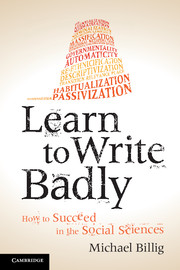Book contents
- Frontmatter
- Contents
- Acknowledgements
- 1 Introduction
- 2 Mass publication and academic life
- 3 Learning to write badly
- 4 Jargon, nouns and acronyms
- 5 Turning people into things
- 6 How to avoid saying who did it
- 7 Some sociological things: governmentality, cosmopolitanization and conversation analysis
- 8 Experimental social psychology: concealing and exaggerating
- 9 Conclusion and recommendations
- References
- Index
4 - Jargon, nouns and acronyms
Published online by Cambridge University Press: 05 June 2013
- Frontmatter
- Contents
- Acknowledgements
- 1 Introduction
- 2 Mass publication and academic life
- 3 Learning to write badly
- 4 Jargon, nouns and acronyms
- 5 Turning people into things
- 6 How to avoid saying who did it
- 7 Some sociological things: governmentality, cosmopolitanization and conversation analysis
- 8 Experimental social psychology: concealing and exaggerating
- 9 Conclusion and recommendations
- References
- Index
Summary
First, a small example, which in itself is utterly irrelevant to my topic but which stands for something wider. Cricket is a game which often appears old fashioned in its laws, dress and codes; most of its followers derive great enjoyment from their sense of the game’s history. Like other major sports today, the game is also a huge commercial enterprise and its administrators, who wish to maximize streams of income, cannot be sentimental about history. Traditionally, cricketers have accepted the decisions of umpires without displays of dissent on the field of play, but, with television providing almost instant replays, the umpires can now be speedily shown to be wrong. Recently, the administrators of international cricket have reacted to changing times by amending the game’s laws (and traditionally cricket has had ‘laws’ not ‘rules’), so that players can, under closely regulated circumstances, request that an umpire’s decision be checked against specified forms of technological evidence. This process has become known as the Umpire Decision Referral System (UDRS).
I do not imagine that many readers of this book will be interested in the intricacies of cricket’s laws or in the new technological advances for improving umpiring decisions – except possibly in relation to one aspect. C. L. R. James, the great cricket writer, literary critic, and Marxist philosopher, used to say that the history of cricket reflected the wider historical forces of the world (James, 1963). The new system for appealing against the decision of an umpire belongs to an age of technology and finance, and culturally to a time which is at ease with questioning official authority. These are not my concerns here, for they do not relate to academic writing. But one aspect does: the new system needed a name. As C. L. R. James would have recognized, it is not haphazard how people choose to name new things, regulations or procedures.
- Type
- Chapter
- Information
- Learn to Write BadlyHow to Succeed in the Social Sciences, pp. 67 - 94Publisher: Cambridge University PressPrint publication year: 2013



